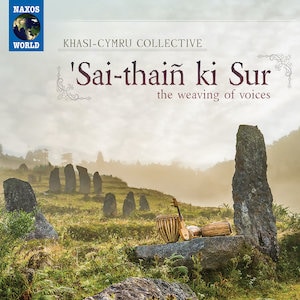
Khasi-Cymru Collective – ‘Sai-thaiñ ki Sur
Naxos World – 28 May 2021
We are, hopefully, much more aware of cultural subjugation these days – though I suspect not everywhere. The British and others from the West have a hefty record of going to interesting places, meeting interesting people and then eradicating their cultural heritage, superimposing their ethics, mores and culture on those inhabitants.
The drivers for this is clearly power, brought together in a heady mixture of commerce and religion and in the Indian sub-continent, the British had a good go at both. Tucked away in the northeastern part of India is the state of Meghalaya, which became a focus for 19th-century missionary fervour. Welsh Calvinists, hungry to evangelise, descended upon this small state in the 1840s and hung on for over 120 years. As a result, there is a lot of Anglo-Welsh influence on the culture of the Khasi and Jaiñtia people.
Thanks to the musicians and poets of the Khasi Hills and the Welsh singer Gareth Bonello (The Gentle Good), we learn more through the release of Sai-thaiñ ki Sur, a Khasi title that translates as The Weaving of Voices.
It is not only voices in this woven cloth. The music, the people and the words all add to the texture. One of the album’s many strengths is that it explores the folk and folklore of both countries and looks as much to the present and the future as it does to the past. On the other side of the world, Bryniau Cassia is an excellent example of a Welsh folk tune becoming a hymn tune, where it may be obscure but survives to this day.
Gareth has been part of a research project based at the University of South Wales, titled Welsh and Khasi Cultural Dialogues, that encourages artistic collaboration between artists from both communities. The album represents a three-year collaboration with those artists during which he spent several weeks at a time in and around the busy Meghalaya capital of Shillong.
The album features a number of people, collaborators, musicians, composers and it is this eclecticism within a broad but defined area that is another strength. One partnership, between Gareth and Desmond Sunn, resulted in the gentle, peaceful Kam Pher, vaguely reminiscent of Tir na Nog and reportedly composed, in a race against the setting sun, in a forest outside of the city of Shillong.
Some of the tracks on this album are essentially field recordings, one being the traditional tune Pahambir recorded in the village of the same name.
This exploration does not stop in the Khasi Hills, There are a number of Welsh traditional tracks: such as Wel, Bachgen and Ifanc Ydwyf; and three are written by Gareth: Cwyn yr Afon, I Shakyllia, and Soso & Waldo. The thing is, none of them, Khasi or Welsh, sound out of place. From the infectious opening track, Mei Mariang, to the traditional Welsh Alawon Cenhaty at the close, you are easily drawn into the world of both countries. Incidentally, that final track is played by Gareth on the duitara, a four-stringed guitar-like instrument of Meghalaya and recorded in Streamlet Cottage, part of the original Welsh mission compound in Mawkhar.
As I have already pointed out, this is not a collection of things past, and the clearest example is To The Men With Hate Speech On Their Lips. The poem is spoken by Lapdiang Syiem, who also chose the album’s title; she wrote it in response to the news of the Khasi Lineage (Amendment) Bill 2018, which would strip women of their status if they married a non-Khasi man. “I am my own woman”, she affirms; while her words pertain to the situation in Khasi, they are entirely apposite for women the world over, constrained by governments, by laws, by moguls. Whatever happens, “You will never be able to touch my identity, let alone define it”. Unfortunately, subjugation is still prevalent in all its forms.
And if you are not satisfied by the music alone, there are very good liner notes by Gareth and more extensive details about the tracks on Bandcamp. There is also lots to follow up in finding out about the links between the cultures of the two countries. For an album that is, by definition ‘an exploration’, ‘Sai-thaiñ ki Sur is a remarkably aurally cohesive work. It does not stagger or jolt. It flows. It is many parts but it is a whole. And it makes you think, which is as good a reason to listen to it as anything else. Excellent.
Order via Bandcamp: https://thegentlegood.bandcamp.com/album/sai-thai-ki-sur-2
